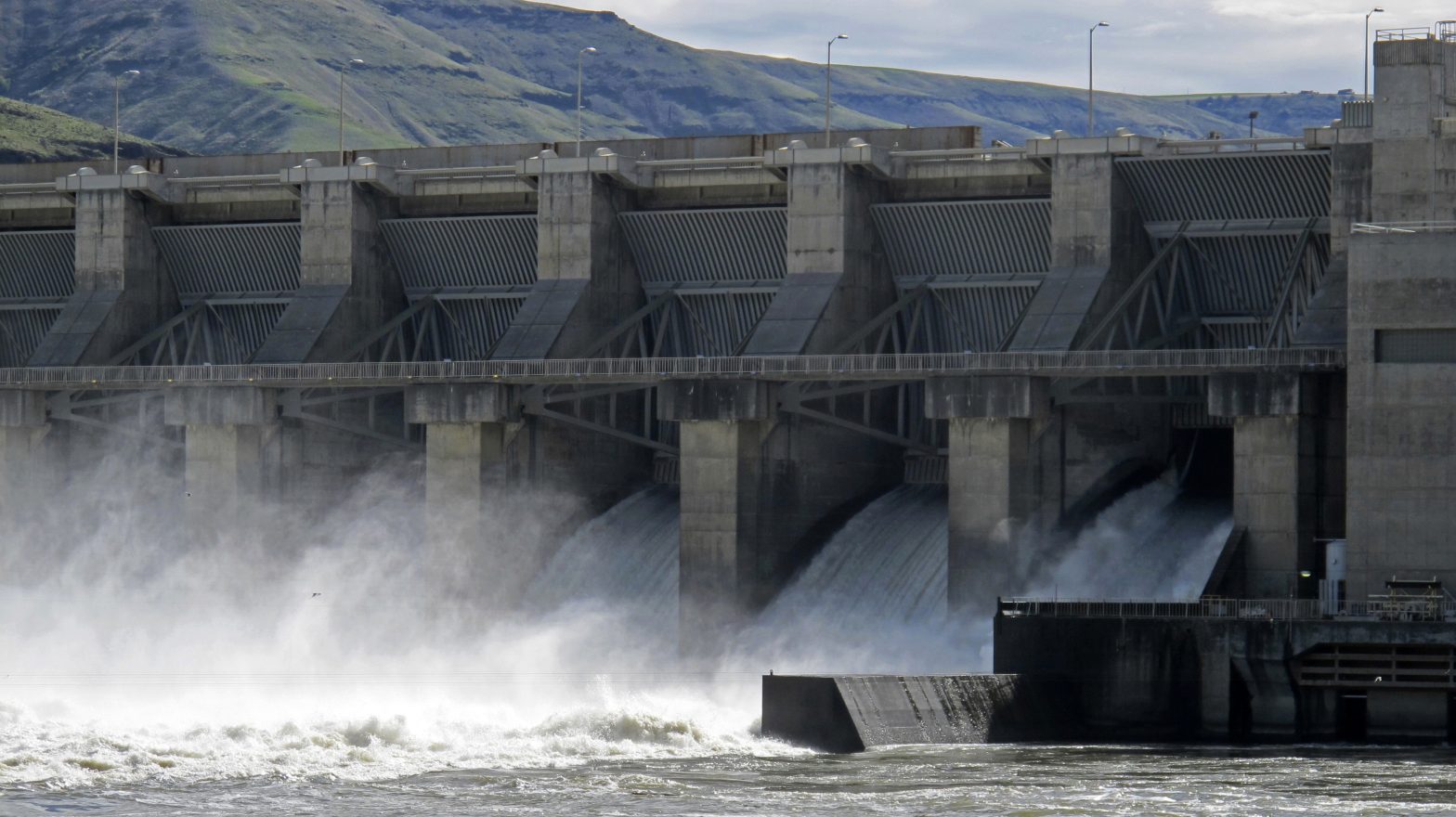Conservationists, Tribes Say Deal With Biden Administration a Road Map to Breach Snake River Dams

SEATTLE (AP) — The U.S. government said Thursday it plans to spend more than $1 billion over the next decade to help recover depleted populations of salmon in the Pacific Northwest, and that it will help figure out how to offset the hydropower, transportation and other benefits provided by four controversial dams on the Snake River, should Congress ever agree to breach them.
President Joe Biden’s administration stopped short of calling for the removal of the dams to save the fish, but Northwest tribes and conservationists who have long sought that called the agreement a road map for dismantling them. Filed in U.S. District Court in Oregon, it pauses long-running litigation over federal operation of the dams and represents the most significant step yet toward breaching them.
“Today’s historic agreement marks a new direction for the Pacific Northwest,” senior White House adviser John Podesta said in a written statement. “Today, the Biden-Harris Administration and state and Tribal governments are agreeing to work together to protect salmon and other native fish, honor our obligations to Tribal nations, and recognize the important services the Columbia River System provides to the economy of the Pacific Northwest.”
The Columbia River Basin, an area roughly the size of Texas, was once the world’s greatest salmon-producing river system, with at least 16 stocks of salmon and steelhead. Today, four are extinct and seven are listed under the Endangered Species Act. Another iconic but endangered Northwest species, a population of killer whales, also depend on the salmon.
Dams are a main culprit behind the salmon’s decline, and federal fisheries scientists have concluded that breaching the dams in eastern Washington on the Snake River, the largest tributary of the Columbia, would be the best hope for recovering them, providing the fish with access to hundreds of miles of pristine habitat and spawning grounds in Idaho.
Conservation groups sued the federal government more than two decades ago in an effort to save the fish. They have argued that the continued operation of the dams violates the Endangered Species Act as well as treaties dating to the mid-19th century ensuring the tribes’ right to harvest fish.
Republicans in Congress who oppose the breaching of the dams released a leaked copy of the draft agreement late last month.
“I have serious concerns about what this agreement means for the future of our region,” Rep. Cathy McMorris Rodgers, a Republican from Washington, said in an emailed statement Thursday. “It jeopardizes the energy, irrigation, and navigation benefits that support our entire way of life, and it makes commitments on behalf of Congress without engaging us.”
Under the agreement, the U.S. government will build enough new clean energy projects in the Pacific Northwest to replace the hydropower generated by the dams — the Ice Harbor, Little Goose, Lower Monumental and Lower Granite.
The agreement includes a compromise regarding dam operations — providing for additional water to be spilled in the spring, fall and winter to help some salmon runs such as spring and summer Chinook, while reducing the spill required in late summer, when energy demand is high and production is especially profitable. That could harm fall Chinook, said the environmental law firm Earthjustice, which is representing environmental, fishing and renewable energy groups in the litigation.
The federal Bonneville Power Administration, which operates the dams, will spend $300 million over 10 years to restore native fish and their habitats throughout the Columbia River Basin, though it said the agreement would result in rate increases of only 0.7%. Two-thirds of that money will go toward hatchery improvements and operations, and the rest will go to what the agreement refers to as the “six sovereigns” — Oregon, Washington and the four tribes involved: the Yakama Nation, the Nez Perce Tribe, the Confederated Tribes of the Umatilla Indian Reservation and the Confederated Tribes of the Warm Springs.
Combined with other fish-restoration funding, the federal government will be spending more than $1 billion over the next decade, the White House said.
The U.S. will also conduct or pay for studies of how the transportation, irrigation and recreation provided by the dams could be replaced. The dams made the town of Lewiston, Idaho, the most inland seaport on the West Coast, and many farmers in the region rely on barges to ship their crops, though rail is also available.
The agreement “lays out a pathway to breaching,” said Shannon Wheeler, chairman of the Nez Perce Tribe. “When these things are replaced, and the Pacific Northwest is transforming into a stronger, more resilient, better place, then there’s a responsibility … to make the decisions that are necessary to make sure these treaty promises are kept.”
Utility and business groups Northwest RiverPartners, the Public Power Council and the Pacific Northwest Waterways Association have opposed the agreement.
“This settlement undermines the future of achieving clean energy goals and will raise the rates of electricity customers across the region while exacerbating the greatest threat to salmon that NOAA scientists have identified – the warming, acidifying ocean,” Northwest RiverPartners said in a news release Thursday.
There has been growing recognition that the harms some dams cause to fish outweigh their usefulness, but only a few lawmakers in the region have embraced the idea. Dams on the Elwha River in Washington state and the Klamath River along the Oregon-California border have been or are being removed.
In 2021 Republican Rep. Mike Simpson of Idaho proposed removing the earthen berms on either side of the four Lower Snake River dams to let the river flow freely, and to spend $33 billion to replace the benefits of the dams.
Last year, Washington Gov. Jay Inslee and Washington U.S. Sen. Patty Murray, both Democrats, released a report saying carbon-free electricity produced by the dams must be replaced before they are breached. Inslee declined to endorse breaching the dams during a conference call with reporters on Thursday, but he said figuring out how to replace their benefits would enable Congress to make a better decision.
“I don’t think this agreement makes anything inevitable, but it does make it much more likely that we’ll have the information we need to make the decision,” he said.
In October, Biden directed federal agencies to use all available resources to restore abundant salmon runs in the Columbia River Basin, but that memo too stopped short of calling for the removal of the dams.
“The energy needs of the Pacific Northwest should not rest on the backs of salmon,” said Donella Miller, fisheries science manager with the Columbia River Inter-Tribal Fish Commission. “What’s good for the salmon is good for the environment, and what’s good for the environment is good for the people.”
___
Associated Press writer Matthew Daly in Washington, D.C., contributed.

























